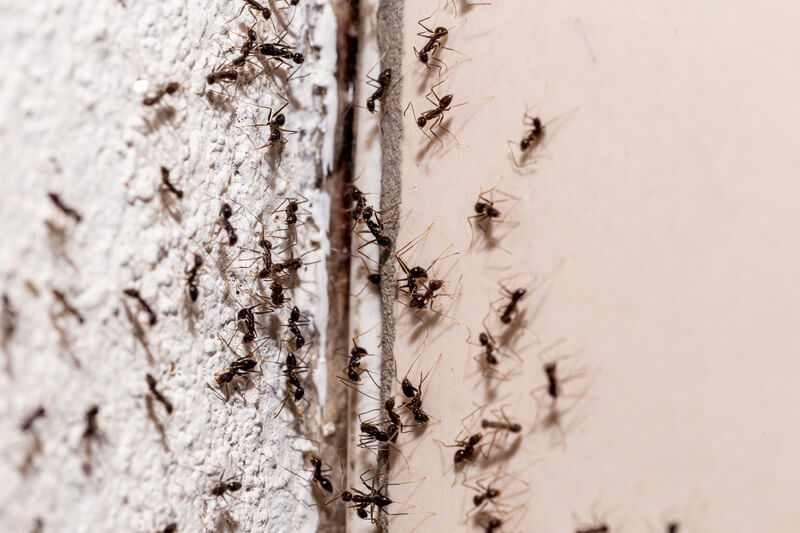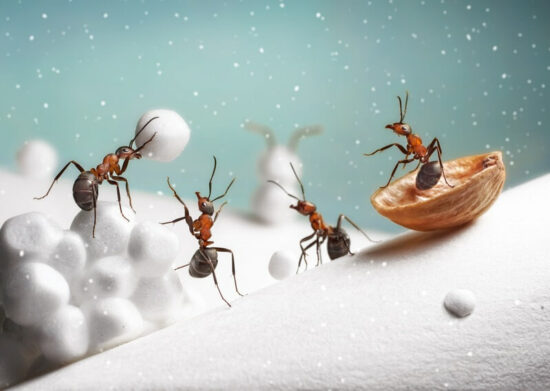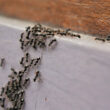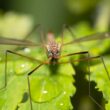Many homeowners don’t know where ants go in the winter, and that leads them to have either a false sense of security or unnecessary paranoia about these insects.
This guide will teach you where ants go in the winter, what they do, and how they survive.
Table of Contents
Where Do Ants Go In The Winter?
If you’re a homeowner, the summer can often seem like a losing battle against an invasion of ants. Go and take a careful look around your property, and you’ll see them everywhere. Whether they are making ant mounds in your grass, or if they have taken over your porch or patio, ants are notorious summertime pests.
However, have you noticed that once the colder weather approaches, these insects seem to magically disappear? Where do ants go in the winter? As a homeowner, are you off the hook?
Because we think that it’s important to be as informed as possible when it comes to these insects and their impacts on your home, we will take a look at what happens to ants once the winter rolls around.
What Do Ants Do In The Winter & How Do They Survive?
After dealing with ants all summer long, you’re probably relieved to see them go away once the colder weather hits. While the “out of sight, out of mind” way of thinking might be alright for some things, it’s not the best policy when it comes to ants.
- Kills common household ants including acrobat, crazy, ghost, little black, odorous house, pavement, and other sweet-eating ants
- As worker ants discover the bait, they share it with the rest of the colony to eliminate them all
- You should see a significant decrease in the number of ants visiting the bait stations within just a few days
- Place stations near areas where you’ve seen ant activity
Contrary to what you might have heard, ants don’t die off in the winter. Believe it or not, there are some kinds of ants that can live for up to 15 years. This means that these ants have developed ways of surviving and thriving through the long, harsh winter months.
While you may think of mammals, such as bears, chipmunks and woodchucks, as the main hibernators, many insects, such as ants and bees, also hibernate during the winter. As the weather gets colder, an ant’s body temperature will start to drop, and its body movements will begin to slow down. Soon it will join its colony in a nice, warm spot underground, under leaf litter or under a rock.
Expert Tip: Most ants don’t store food for the winter. Instead, they feast on high-fat foods in the late summer and fall in order to have enough fats, proteins and carbohydrates to keep them alive during the winter.
The Cause Of Ants In Your House During The Winter
In general, ants are not going to choose the inside of your house as a place to go for the winter. They ideally are attracted to other things outside where they already have their tunnels, their hiding places and their queen.

If you see ants inside your house during the cold winter months, then you need to deal with the problem ASAP. Having ants in your house during the winter usually means that you have an established colony of ants inside your walls, in a door frame, around a window or in your attic or basement. In other words, the ant nest could be just about anywhere.
Why would ants set up shop inside your house? It’s probably because you are providing them with all the things they need: food, water and shelter. If you always have crumbs on the floor, if you have open food items in your kitchen or if you have pets, then ants are going to look at this like a free buffet.
How To Deal With Them
If you discover ants in your house during the winter, be aware that they will require a serious effort to remove. For many people, the best choice is to call in the experts if the infestation is too much to deal with on their own.
However, if you want to give it a shot yourself then there are a few things that you can do. Just remember that any measures you take will often be a band aid and not a permanent solution.
Look For Entry Points & Block Them Up
One very important step that you can take to stop finding ants in your house in the winter is to search the outside of your house for entry points. A pest control specialist will most likely do this as well, but it’s a good idea for you to give your home a careful inspection before your exterminator gets there. This way you will be able to point out the places where you notice ants coming and going.
Some good places to check are cracks in your home’s exterior, near your home’s foundation and near doors and windows. Even after a thorough examination, you may not be able to tell where the ants are getting in, and this is why it’s good to have an exterminator have a look as well.
Once you’ve determined how the ants have gotten into your house (and stayed during the winter), or if you have merely found potential entry points, then it’s time to block up all the possibilities. Repair or caulk any cracks, fix rotten or cracked wood around doors and windows and trim back any tree branches that are touching your house.
Expert Tip: A great time to do this is in the fall when you’re cleaning up the yard, bringing in lawn furniture and preparing your house for what ants inevitably do during the winter.
Keep It Clean
Another thing you can do to discourage ants from going into your house and staying during the winter is to keep it clean. Even if you consider yourself to be a pretty good housekeeper, you might need to rethink a few things. A few more minutes of extra cleaning could make the difference between an ant-free home and a real problem.
So what kind of changes are we talking about?
First, we suggest that you store all of your pantry items in plastic containers or ziploc bags. This means things like chips, sugar, cereal, pasta, rice and all snacks should be tightly sealed away in some kind of plastic.
Pet food is a real draw for ants, so keep your pet’s food area very clean. After your pets are done eating, make sure that all leftover food is thrown away and the area is free of stray kibbles.
Make sure that you vacuum and mop the floors often. By this we mean the kitchen, dining room and living room floors. You’re going to want to make sure that you are diligent with cleaning in any rooms where people are eating or drinking. Also, we suggest saying no to drinking or eating in bedrooms.
Expert Tip: Other helpful things you can do include wiping countertops and kitchen sinks on a regular basis, taking out the trash and keeping indoor trash cans closed.
Use Ant Bait
If it’s clear that ants have gone into your house during the winter, you can try to put out some ant bait. In our opinion, it’s best to have a pest control specialist deal with any serious issues, but many homeowners have success starting this process themselves.
- Kills common household ants including acrobat, crazy, ghost, little black, odorous house, pavement, and other sweet-eating ants
- As worker ants discover the bait, they share it with the rest of the colony to eliminate them all
- You should see a significant decrease in the number of ants visiting the bait stations within just a few days
- Place stations near areas where you’ve seen ant activity
There are many different kinds of bait you can try, and which one you use depends on your particular situation and the type of ant you’re dealing with in the winter.
Gel-based ant bait is the kind that we feel is the best. It’s inexpensive, doesn’t involve smelly and dangerous sprays, and it’s easily carried back to the nest. The one drawback is that there could be increased swarming around the bait for a few days.
Granule-type baits are very popular. With a granular bait, you just sprinkle it around the places where you see ants. Most granular baits can be used inside and outside the home. The trouble with granular baits is that the pieces are often difficult for the ants to carry back to the nest. Also, having granules around could be tempting to pets, birds or small children.
You could go the more traditional route with poison-laced ant cups or a spray can of ant killer, but these have drawbacks and require a strong understanding of the product. If you’re desperate and are dealing with ants in the wintertime, it might be a better decision to call a professional.
Common Ants Found In Homes During The Winter
How you handle your ants in the winter depends a lot on the kind of ant you’re dealing with. There are several species that are known to show up in homes during the winter, so let’s take a quick look at some of the kinds that you may encounter.
One species of ant you’re likely to see inside your home during the winter is the carpenter ant. Carpenter ants that remain outside will hibernate, but if they have nested in your walls or woodwork, and your house is nice and toasty, then they will become active and begin to explore your kitchen or bathroom. Carpenter ants chew wood, so you’ll need to get rid of them quickly if you see any.
Another kind of ant that you may come across is the odorous house ant. It is sometimes also referred to as a sugar ant, coconut ant or stink ant. They are called odorous ants because they give off a bad smell if they are crushed.
Little black ants who have gone into hibernation in the winter will sometimes reemerge if they sense warmth, or if something disturbs their nest. These ants will commonly nest behind walls, around rotten wood, near masonry and in wall gaps.
Acrobat ants, crazy ants and ghost ants are some of the other types of ants that can be found inside your home during the winter months.
Ants In Your Kitchen In The Winter
As we mentioned earlier, if you see ants in your kitchen in the winter, it’s usually an indication of a much bigger problem. Since outside ants are hibernating, any ant activity in your kitchen means that the ants are coming from a colony or nest that is already established in your walls or other spot in your home. Instead of hunkering down like outdoor ants in the winter, the warmth of your house tricks them into thinking that warmer weather is here.
The main reason that you may be seeing ants in your kitchen is that a kitchen provides ants with all manner of tempting goodies. Unknowingly drop a cookie crumb? Ants are going to snatch it up. What about that box of cereal that didn’t quite get closed enough? Ants will find that and more.
Ants need water too, and a dripping faucet or a sink full of dishes left to soak overnight could become an ant magnet.
Your best bet, as discussed earlier, is to be committed when it comes to cleaning your kitchen. This means that counters, floors and refrigerator handles should be wiped down at all times. Keep all food items in the fridge or in plastic containers.
Ants In Your Bathroom In The Winter
Have you ever been surprised to see ants in your bathroom in the winter? Shouldn’t the kitchen be where all the ants hang out? Believe it or not, your bathroom can seem like paradise to a colony of ants.
Think about it. A bathroom has just about everything an ant could want (both in the wintertime and summer months). There’s plenty of moisture, and ants love the toasty temperature of a bathroom, especially after someone takes a hot shower or bath. Ants also love, as gross as it sounds, any strands of hair that have accumulated in sink or shower drains. Many ants will eat this hair as well as the slime that has built up on the hair (yuck).
Bathrooms have lots of smells that ants find irresistible. Whether it’s the scent of your favorite body wash, your toothpaste or your shampoo, ants will be attracted to the smell of the chemicals in these products.
Moisture is probably the thing that attracts ants the most, even in the winter. Even if you wipe everything down after every bath or shower, there is still going to be some moisture somewhere. If you have rotten wood behind the walls or a hidden leak, ants are going to find it.
Conclusion
Now that you’re familiar with where ants go in the winter you can use this information to protect your home when the cold months come. Being able to recognize the behavior of these insects at different times of the year will make it easier for you to act quickly if you see anything you don’t like.
If you have any questions about dealing with ants in your house in the wintertime, send us a message. We’ll respond to you as soon as we can!



